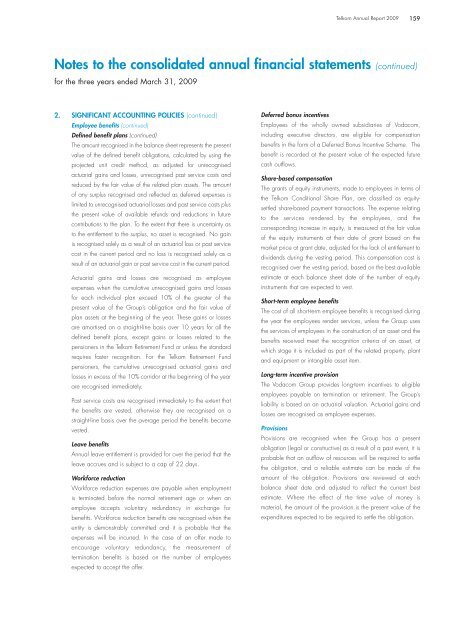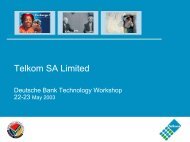Telkom AR front.qxp
Telkom AR front.qxp
Telkom AR front.qxp
You also want an ePaper? Increase the reach of your titles
YUMPU automatically turns print PDFs into web optimized ePapers that Google loves.
2. SIGNIFICANT ACCOUNTING POLICIES (continued)<br />
Employee benefits (continued)<br />
Defined benefit plans (continued)<br />
The amount recognised in the balance sheet represents the present<br />
value of the defined benefit obligations, calculated by using the<br />
projected unit credit method, as adjusted for unrecognised<br />
actuarial gains and losses, unrecognised past service costs and<br />
reduced by the fair value of the related plan assets. The amount<br />
of any surplus recognised and reflected as deferred expenses is<br />
limited to unrecognised actuarial losses and past service costs plus<br />
the present value of available refunds and reductions in future<br />
contributions to the plan. To the extent that there is uncertainty as<br />
to the entitlement to the surplus, no asset is recognised. No gain<br />
is recognised solely as a result of an actuarial loss or past service<br />
cost in the current period and no loss is recognised solely as a<br />
result of an actuarial gain or past service cost in the current period.<br />
Actuarial gains and losses are recognised as employee<br />
expenses when the cumulative unrecognised gains and losses<br />
for each individual plan exceed 10% of the greater of the<br />
present value of the Group’s obligation and the fair value of<br />
plan assets at the beginning of the year. These gains or losses<br />
are amortised on a straight-line basis over 10 years for all the<br />
defined benefit plans, except gains or losses related to the<br />
pensioners in the <strong>Telkom</strong> Retirement Fund or unless the standard<br />
requires faster recognition. For the <strong>Telkom</strong> Retirement Fund<br />
pensioners, the cumulative unrecognised actuarial gains and<br />
losses in excess of the 10% corridor at the beginning of the year<br />
are recognised immediately.<br />
Past service costs are recognised immediately to the extent that<br />
the benefits are vested, otherwise they are recognised on a<br />
straight-line basis over the average period the benefits become<br />
vested.<br />
Leave benefits<br />
Annual leave entitlement is provided for over the period that the<br />
leave accrues and is subject to a cap of 22 days.<br />
Workforce reduction<br />
Workforce reduction expenses are payable when employment<br />
is terminated before the normal retirement age or when an<br />
employee accepts voluntary redundancy in exchange for<br />
benefits. Workforce reduction benefits are recognised when the<br />
entity is demonstrably committed and it is probable that the<br />
expenses will be incurred. In the case of an offer made to<br />
encourage voluntary redundancy, the measurement of<br />
termination benefits is based on the number of employees<br />
expected to accept the offer.<br />
<strong>Telkom</strong> Annual Report 2009 159<br />
Notes to the consolidated annual financial statements (continued)<br />
for the three years ended March 31, 2009<br />
Deferred bonus incentives<br />
Employees of the wholly owned subsidiaries of Vodacom,<br />
including executive directors, are eligible for compensation<br />
benefits in the form of a Deferred Bonus Incentive Scheme. The<br />
benefit is recorded at the present value of the expected future<br />
cash outflows.<br />
Share-based compensation<br />
The grants of equity instruments, made to employees in terms of<br />
the <strong>Telkom</strong> Conditional Share Plan, are classified as equitysettled<br />
share-based payment transactions. The expense relating<br />
to the services rendered by the employees, and the<br />
corresponding increase in equity, is measured at the fair value<br />
of the equity instruments at their date of grant based on the<br />
market price at grant date, adjusted for the lack of entitlement to<br />
dividends during the vesting period. This compensation cost is<br />
recognised over the vesting period, based on the best available<br />
estimate at each balance sheet date of the number of equity<br />
instruments that are expected to vest.<br />
Short-term employee benefits<br />
The cost of all short-term employee benefits is recognised during<br />
the year the employees render services, unless the Group uses<br />
the services of employees in the construction of an asset and the<br />
benefits received meet the recognition criteria of an asset, at<br />
which stage it is included as part of the related property, plant<br />
and equipment or intangible asset item.<br />
Long-term incentive provision<br />
The Vodacom Group provides long-term incentives to eligible<br />
employees payable on termination or retirement. The Group’s<br />
liability is based on an actuarial valuation. Actuarial gains and<br />
losses are recognised as employee expenses.<br />
Provisions<br />
Provisions are recognised when the Group has a present<br />
obligation (legal or constructive) as a result of a past event, it is<br />
probable that an outflow of resources will be required to settle<br />
the obligation, and a reliable estimate can be made of the<br />
amount of the obligation. Provisions are reviewed at each<br />
balance sheet date and adjusted to reflect the current best<br />
estimate. Where the effect of the time value of money is<br />
material, the amount of the provision is the present value of the<br />
expenditures expected to be required to settle the obligation.




